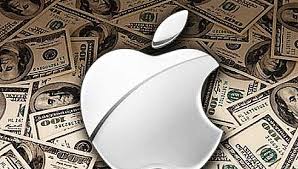
The way for Apple Inc. to bring bac home about $252.3 billion foreign cash pile has been cleared by the U.S. Republican tax overhaul that was passed by Congress this week. the IT giant will not have to face any significant tax burden by returning of the cash back to the U.S. – which was the primary reason that the company had stacked the cash in foreign banks.
Another boog book for Apple is the slashing of the corporate tax rate from 35 percent to 21 percent.
However, there are some problems for Apple as well. Tax experts said that there could be changes in the amount of cash taxes payable by Apple on profits derived from patents held abroad due to the expected difference between the one passed by the Senate and the final version.
One of the major aspects of tax practices of Apple for decades was to shift the profits of foreign patent overseas.
This effectively mean that patents and other intellectual property such as trademarks accounts for a large portion of the value of its products. Apple then chooses countries with low tax rates after assigning some of that IP value in proportion to overseas sales and thereby assesses substantial patent royalties on sales. Such money gained from royalties is then transferred to low-tax countries such as Ireland.
That maneuvering of money has been made less attractive for Apple in the bill. Gavin Ekins, a research economist with the Tax Foundation said that 13 percent would be the the minimum tax on foreign patent income in one clause of the bill.
On the other hand, the rates of taxes on profits made from patents held in the United States has been reduced to 13.1 percent from the current 21 percent which would be almost the same as in cases if such patents were held in low tax countries.
Ekins said that Congressional Republicans “don’t want the tax rate to be a consideration in where you put your intellectual property”. “The whole intention (of the measures) is to bring back that intellectual property to the United States.”
In countries like he United Kingdom, there are “patent boxes” which encourage companies to create and retain the profits within the country and some sections of the bill are similar to such steps.
Ed Kleinbard, a tax professor at the University of California and former chief of staff of the U.S. Congress’s Joint Committee on Taxation said that the Congress “screwed it up”. “It’s kind of weird that they created the patent box, but didn’t give a pass to bring things back.”
Apple could have to pay higher taxes abroad given the minimum taxes that they now would be paying in the U.S. for overseas patents.
“I‘m willing to bet a dollar that 13.1 percent is higher than Apple’s actual non-U.S. tax rate,” said Kleinbard. “It’s entirely possible their cash tax bill going forward would go up based on this alone.”
While Apple Chief Executive Tim Cook has earlier said that the company wants to get back cash in foreign countries back home but has not specified the amount.
(Source:www.reuters.com)
Another boog book for Apple is the slashing of the corporate tax rate from 35 percent to 21 percent.
However, there are some problems for Apple as well. Tax experts said that there could be changes in the amount of cash taxes payable by Apple on profits derived from patents held abroad due to the expected difference between the one passed by the Senate and the final version.
One of the major aspects of tax practices of Apple for decades was to shift the profits of foreign patent overseas.
This effectively mean that patents and other intellectual property such as trademarks accounts for a large portion of the value of its products. Apple then chooses countries with low tax rates after assigning some of that IP value in proportion to overseas sales and thereby assesses substantial patent royalties on sales. Such money gained from royalties is then transferred to low-tax countries such as Ireland.
That maneuvering of money has been made less attractive for Apple in the bill. Gavin Ekins, a research economist with the Tax Foundation said that 13 percent would be the the minimum tax on foreign patent income in one clause of the bill.
On the other hand, the rates of taxes on profits made from patents held in the United States has been reduced to 13.1 percent from the current 21 percent which would be almost the same as in cases if such patents were held in low tax countries.
Ekins said that Congressional Republicans “don’t want the tax rate to be a consideration in where you put your intellectual property”. “The whole intention (of the measures) is to bring back that intellectual property to the United States.”
In countries like he United Kingdom, there are “patent boxes” which encourage companies to create and retain the profits within the country and some sections of the bill are similar to such steps.
Ed Kleinbard, a tax professor at the University of California and former chief of staff of the U.S. Congress’s Joint Committee on Taxation said that the Congress “screwed it up”. “It’s kind of weird that they created the patent box, but didn’t give a pass to bring things back.”
Apple could have to pay higher taxes abroad given the minimum taxes that they now would be paying in the U.S. for overseas patents.
“I‘m willing to bet a dollar that 13.1 percent is higher than Apple’s actual non-U.S. tax rate,” said Kleinbard. “It’s entirely possible their cash tax bill going forward would go up based on this alone.”
While Apple Chief Executive Tim Cook has earlier said that the company wants to get back cash in foreign countries back home but has not specified the amount.
(Source:www.reuters.com)














